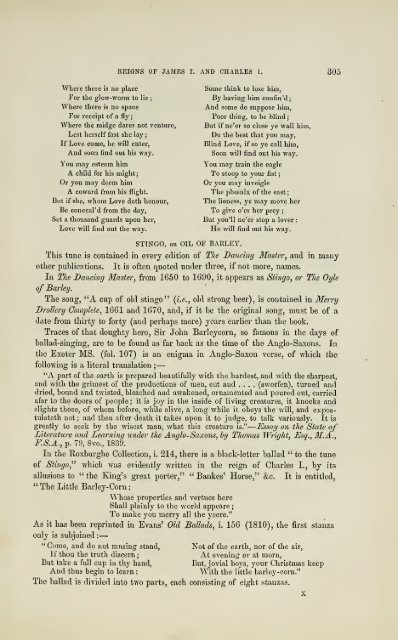Popular music of the olden time. A collection of ancient songs ...
Popular music of the olden time. A collection of ancient songs ...
Popular music of the olden time. A collection of ancient songs ...
Create successful ePaper yourself
Turn your PDF publications into a flip-book with our unique Google optimized e-Paper software.
REIGNS OF JAMES I. AND CHARLES I. 305<br />
Where <strong>the</strong>re is no place<br />
For <strong>the</strong> glow-worm to lie ;<br />
Where <strong>the</strong>re is no space<br />
For receipt <strong>of</strong> a fly<br />
Where <strong>the</strong> midge dares not venture,<br />
Lest herself fast she la}'<br />
If Love come, he will enter,<br />
And soon find out his way.<br />
You may esteem him<br />
A child for his might;<br />
Or you may deem him<br />
A coward from his flight.<br />
But if she, whom Love doth honour,<br />
Be conceal'd from <strong>the</strong> day.<br />
Set a thousand guards upon her,<br />
Love will find out <strong>the</strong> way.<br />
Some think to lose him,<br />
By having him confin'd;<br />
And some do suppose him,<br />
Poor thing, to be blind<br />
But if ne'er so close ye wall him,<br />
Uo <strong>the</strong> best that you may.<br />
Blind Love, if so ye call him.<br />
Soon will find out his way.<br />
You may train <strong>the</strong> eagle<br />
To stoop to your fist<br />
Or you may inveigle<br />
The phoenix <strong>of</strong> <strong>the</strong> east<br />
The lioness, ye may move her<br />
To give o'er her prey ;<br />
But you'll ne'er stop a lover<br />
He will find out his way.<br />
STINGO, on OIL OF BARLEY.<br />
This tune is contained in every edition <strong>of</strong> Tlie Dancing Master, and in many<br />
o<strong>the</strong>r publications.<br />
It is <strong>of</strong>ten quoted under three, if not more, names.<br />
In The Dancing Master, from 1650 to 1690, it appears as Stingo, or The Ogle<br />
<strong>of</strong> Barley.<br />
The song, "A cup <strong>of</strong> old stingo" (i.e., old strong beer), is contained in Merry<br />
Drollery Complete, 1661 and 1670, and, if it be <strong>the</strong> original song, must be <strong>of</strong> a<br />
date from thirty to forty (and perhaps more) years earlier than <strong>the</strong> book.<br />
Traces <strong>of</strong> that doughty hero, Sir John Barleycorn, so famous in <strong>the</strong> days <strong>of</strong><br />
ballad-singing, are to be found as far back as <strong>the</strong> <strong>time</strong> <strong>of</strong> <strong>the</strong> Anglo-Saxons.<br />
<strong>the</strong> Exeter MS. (fol. 107) is an enigma in Anglo-Saxon verse, <strong>of</strong> Avhich <strong>the</strong><br />
following is a literal translation ;<br />
"A part <strong>of</strong> <strong>the</strong> earth is prepared beautifully with <strong>the</strong> hardest, and with <strong>the</strong> sharpest,<br />
and with <strong>the</strong> grimest <strong>of</strong> <strong>the</strong> productions <strong>of</strong> men, cut and .... (sworfen), turned and<br />
dried, bound and twisted, bleached and awakened, ornamented and poured out, carried<br />
afar to <strong>the</strong> doors <strong>of</strong> people ; it is joy in <strong>the</strong> inside <strong>of</strong> living creatures, it knocks and<br />
slights those, <strong>of</strong> whom before, while alive, a long while it obeys <strong>the</strong> will, and expostulateth<br />
not ; and <strong>the</strong>n after death it takes upon it to judge, to talk variously. It is<br />
greatly to seek by <strong>the</strong> wisest man, what this creature is."- Essay on <strong>the</strong> State <strong>of</strong><br />
Literature and Learning under <strong>the</strong> Anglo-Saxons, by Thomas Wright, Esq., M.A.,<br />
F.S.A., p. 79, 8vo., 1839.<br />
In <strong>the</strong> Roxburghe Collection, i. 214, <strong>the</strong>re is a black-letter ballad " to <strong>the</strong> tune<br />
<strong>of</strong> Stingo," which was evidently -written in <strong>the</strong> reign <strong>of</strong> Charles I., by its<br />
allusions to " <strong>the</strong> King's great porter," " Eankes' Horse," &c. It is entitled,<br />
"The Little Barley-Corn:<br />
Whose properties and vertues here<br />
Shall plainly to <strong>the</strong> world appeare ;<br />
To make you merry all <strong>the</strong> yeere."<br />
As it has been reprinted in Evans' Old Ballads, i. 156 (1810), <strong>the</strong> first stanza<br />
only is subjoined :<br />
" Come, and do not musing stand, Not <strong>of</strong> <strong>the</strong> earth, nor <strong>of</strong> <strong>the</strong> air,<br />
If thou <strong>the</strong> truth discern<br />
At evening or at morn.<br />
But take a full cup in thy hand.<br />
But, jovial boys, your Christmas keep<br />
And thus begin to learn<br />
With <strong>the</strong> little barley-corn."<br />
The ballad is divided into two parts, each consisting <strong>of</strong> eight stanzas.<br />
X<br />
In

















